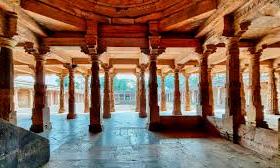
Archaeological survey of Bhojshala Complex gets 8-week extension
text_fieldsThe Indore bench of the Madhya Pradesh High Court has granted an additional eight weeks to the Archaeological Survey of India (ASI) to conduct its scientific survey of the disputed medieval-era Bhojshala Temple-Kamal Maula Mosque complex.
However, the division bench of Justices SA Dharmadhikari and Gajendra Singh clarified that the ASI would not receive any further extension beyond this 8-week period.
The bench has scheduled the next hearing for July 4 and instructed the ASI to submit its final report by then.
In addition, a plea from a group of Muslims seeking a stay on the survey work has been rejected by the court.
The Maulana Kamaluddin Welfare Society, representing the Muslim community, raised objections to the ASI's request for more time, alleging that the ASI was conducting excavations contrary to the Supreme Court's order.
On April 1, the Supreme Court emphasized that "no physical excavation should be taken which will change the character of the premises in question," while declining to halt the "scientific survey" of Bhojshala.
The High Court dismissed the objection of the Maulana Kamaluddin Welfare Society and stated that the respondent was free to approach the appropriate forum if any violation occurred.
The Bhojshala complex, an ASI-protected 11th-century monument, is considered by Hindus to be a temple dedicated to Vagdevi (Goddess Saraswati), while the Muslim community refers to it as Kamal Maula Mosque.
Under an arrangement made by the ASI in April 2003, Hindus perform puja in the Bhojshala premises on Tuesdays, while Muslims offer namaz on Fridays.
On March 11, the High Court directed the ASI to conduct a "scientific survey" of the Bhojshala-Kamal Moula mosque complex within six weeks, following a plea from the Hindu Front for Justice (HFJ). The survey commenced on March 22.
On April 22, the ASI filed an application stating the need for more time to conduct the survey and understand the nature of exposed portions of the structures in the disputed premises.
The ASI's application highlighted that a detailed survey of the complex and its peripheral area was underway using scientific tools, along with documentation of the entire monument. Additionally, excavation was progressing systematically, and more time was required to understand the nature of exposed portions of the structures.
The ASI also mentioned its request to the National Geophysical Research Institute (NGRI) to conduct a ground-penetrating radar (GPR) survey, with an NGRI team regularly surveying the area in compliance with the High Court's directions.






















